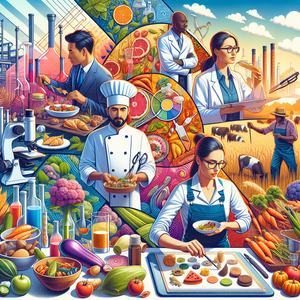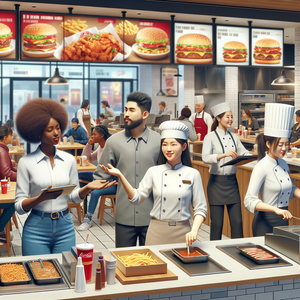Beyond the Plate: Careers in Sustainable Food Systems

Sustainable food systems aim to produce food in a manner that is environmentally sound, socially just, and economically viable. This multifaceted approach addresses pressing global challenges, including climate change, food security, and resource depletion. The significance of sustainable food systems is underscored by a growing body of research linking conventional agricultural practices to environmental degradation. According to the United Nations, food systems contribute to nearly 30% of global greenhouse gas emissions. As such, careers in this sector are not merely jobs; they represent contributions to a larger movement that seeks to create a healthier planet and community.
Urban Farming: Cultivating Change
One of the most visible manifestations of sustainable food systems is urban farming. Urban farms leverage limited space in cities to grow fresh produce, reduce food miles, and foster community engagement. Careers in this sphere include urban farmers, educators, and community organizers who implement farming practices aimed at regenerating the environment. Organizations like Brooklyn Grange in New York City exemplify this movement. They operate rooftop farms that yield thousands of pounds of organic produce annually while offering educational programs for local residents. These urban farms serve as models for sustainability, demonstrating that food production can flourish even in densely populated areas. Urban farming not only provides fresh food but also strengthens community ties and promotes local economies.
Food Policy Advocacy: Shaping the Future
Another critical area within sustainable food systems is food policy advocacy. Professionals in this field work to influence legislation and public policies affecting food production, access, and safety. They may be employed by non-profits, governmental agencies, or grassroots organizations, advocating for initiatives that promote sustainable agriculture, food equity, and consumer rights. Organizations like the Food Policy Council of New York City focus on integrating community voices into food policy decision-making. Their efforts have led to initiatives that enhance access to healthy food in underserved neighborhoods and promote sustainable agricultural practices. By advocating for policies that support sustainable food systems, these professionals help shape the future of food production and access.
Zero-Waste Culinary Practices: Redefining Food Production
As the culinary world seeks to minimize waste, zero-waste culinary practices have gained traction. Chefs and culinary professionals are discovering innovative ways to utilize every part of an ingredient, thereby reducing food waste and creating dishes that tell a story of sustainability. This approach not only reflects a commitment to the environment but also enhances creativity in the kitchen. Renowned chefs like Dan Barber, whose restaurant Blue Hill at Stone Barns champions farm-to-table practices, exemplify this philosophy. Barber’s commitment to zero-waste cooking highlights the value of ingredients while educating consumers about the importance of sustainability in their own kitchens. His initiatives challenge both chefs and diners to rethink their relationship with food, fostering a culture of sustainability within the culinary arts.
Education and Outreach: Inspiring the Next Generation
Education and outreach are vital components of sustainable food systems. Professionals in this area work to raise awareness about sustainable practices, teaching individuals and communities how to grow their own food, understand food systems, and make informed choices. This includes roles as educators in schools, community gardens, or culinary programs emphasizing sustainability. Organizations such as 4-H and local cooperative extensions offer programs that empower young people to engage with agriculture and sustainability. By teaching the next generation about responsible food systems, these programs play a crucial role in shaping future leaders in the field. Education in sustainable food systems is not merely about food production; it encompasses a holistic understanding of food's role in health, culture, and the environment.
The demand for sustainable food systems professionals is not just a trend; it represents a necessary evolution in how we think about food and its impact on our world. From urban farmers and policy advocates to zero-waste chefs and educators, the opportunities in this field are both diverse and impactful. As we continue to confront global challenges, those who choose careers in sustainable food systems are leading the charge toward a more equitable and environmentally friendly food landscape. For anyone passionate about food and its potential to create positive change—beyond the plate—this is a call to action. The movement toward sustainable food systems is not only about transforming agriculture; it is about creating a future where food nourishes not just our bodies, but our planet and communities as well.
Urban Farmer
Brooklyn Grange, Green City Growers, local urban agriculture initiatives
Core Responsibilities
Cultivate a variety of crops using sustainable practices in urban settings, such as rooftop gardens and community plots.
Engage with local communities to provide education on urban agriculture and its benefits.
Implement crop rotation and organic pest management strategies to enhance yield while minimizing environmental impact.
Required Skills
Strong understanding of horticulture and sustainable farming techniques.
Excellent communication skills for community engagement and education.
Experience with soil health management and local food systems.
Food Policy Advocate
Food Policy Council of New York City, The Center for Food Safety, various non-profit organizations
Core Responsibilities
Research and analyze food-related policies and legislation to promote sustainable practices and food equity.
Collaborate with government agencies, non-profits, and community organizations to influence policy changes.
Organize campaigns and outreach programs to raise public awareness about food sustainability issues.
Required Skills
Strong analytical skills for policy research and advocacy.
Experience in grassroots organizing and coalition-building.
Knowledge of local, state, and federal food policies and their implications.
Zero-Waste Chef
Restaurants like Blue Hill at Stone Barns, catering companies focused on sustainability, culinary schools with a farm-to-table approach
Core Responsibilities
Develop menus that incorporate the entirety of food ingredients to significantly reduce kitchen waste.
Collaborate with local farmers and suppliers to source ingredients that align with zero-waste principles.
Educate staff and customers on sustainable culinary practices and the importance of food waste reduction.
Required Skills
Culinary expertise with a focus on innovation in using food scraps and lesser-known ingredients.
Passion for sustainability and an understanding of the environmental impact of food waste.
Strong leadership and training skills for kitchen staff and outreach efforts.
Sustainable Agriculture Educator
4-H, local cooperative extensions, educational non-profits focused on agriculture and sustainability
Core Responsibilities
Design and implement educational programs that teach sustainable farming practices to students and community members.
Facilitate workshops that cover topics such as organic gardening, soil health, and crop diversity.
Collaborate with schools and community organizations to integrate sustainability into their curricula.
Required Skills
Experience in teaching and curriculum development, especially related to agriculture or environmental science.
Knowledge of sustainable farming principles and practices.
Strong interpersonal skills for community engagement and outreach.
Sustainability Consultant for Food Systems
Consulting firms specializing in sustainability, corporate sustainability departments, non-profit organizations focused on food systems
Core Responsibilities
Assess current food supply chains and recommend strategies for improving sustainability and reducing environmental impact.
Work with businesses to develop sustainable sourcing policies and practices.
Conduct workshops and training sessions for food businesses on sustainability initiatives.
Required Skills
Strong background in environmental science, agriculture, or food systems.
Excellent analytical and problem-solving skills to identify inefficiencies and propose solutions.
Experience in business consulting or project management, especially in the food industry.


